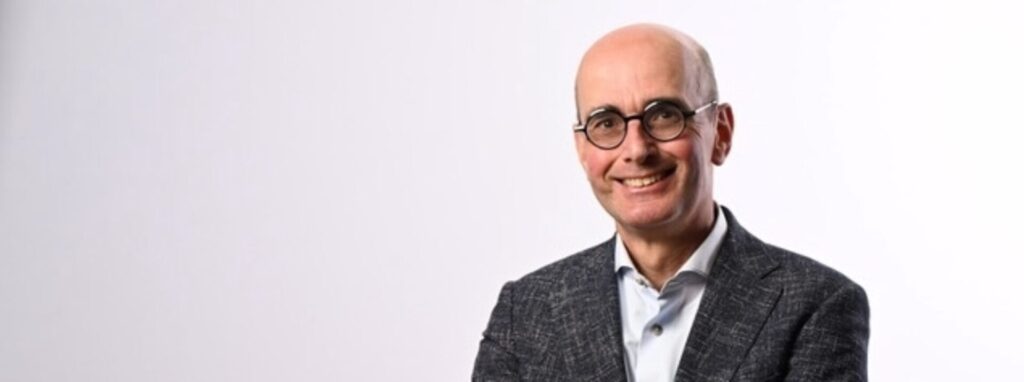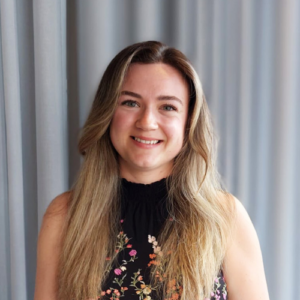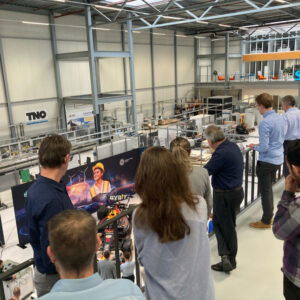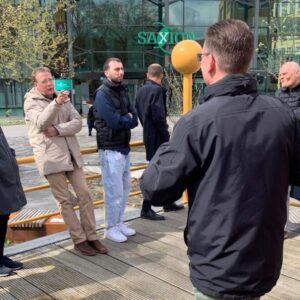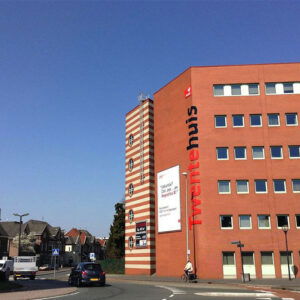Hannah Fults, a PhD candidate at the KIN Center for Digital Innovation, who is working towards WP3, spoke with Henk Akkermans, one of the key Fieldlabs@Scale project team members and a top expert in field labs. Henk, who juggles his roles as a professor at Tilburg University and director of World Class Maintenance, shared his take on blending academia and practice and offered researchers clever strategies to keep their work from gathering dust. And when it came to field labs, Henk shared his advice for keeping up—let’s just say it involves some food, drinks, and a little bit of strategic timing!
Hannah: How do you balance the interest between your role in practice and your academic role?
Henk: I’m not sure. I think I’ve been doing it so long now that it’s like tying your shoelaces; it’s just me. At the tender age of, well, 40 years ago, I started combining academic research and consulting, and I’m still doing it now. I’m not your typical practitioner, and not your typical researcher either. I just have this analytical mindset where I think there’s nothing more practical than a good theory, and all my research topics come from interactions with practice. So it becomes a very natural mix of things. But on an average day, I must switch at least three times back and forth.
Hannah: So you see them as complementing each other?
Henk: Complementing suggests that it’s like water and oil; they don’t mix. But I see it as water and sugar—they completely mix; it’s just difficult to say where one starts and the other begins. Even if I’ve written many papers about consulting projects, sometimes I would have a paper ready before I had to write a report for the consulting. So it’s just a blend.
Hannah: Could you give more specific examples: maybe insights from your research that have been integrated into World Class Maintenance?
Henk: It’s a cyclical process, so there is no beginning or end. What am I in Fieldlabs@Scale? Am I a practitioner or a professor? Some of the field labs I’ve been involved in are studied from a practitioner perspective. The way we set them up—this idea of organizing, conference building—is just as much based on my PhD research. They involve a lot of work on supply chain collaboration, how people coordinate their activities in the absence of a central authority, and issues of trust and transparency. There’s a theoretical impact, but I learned that as a consultant. It’s really difficult to say, “Here is an academic piece that I applied here,” because before it became an academic piece, it was an applied piece. And maybe the first time I applied it, I did so while reading a book, where I came across a technique to use.
Hannah: Could you advise on strategies for researchers on how to translate research insights into actionable practices?
Henk: I would not treat the two as different. When you’re interacting with practice, stay the researcher: keep asking ‘why’ questions, keep thinking long-term, and keep considering where you’ve heard something before or who has written about it. First, you’re good at that and they are not, so you add value to the discussion. Second, you’re not good at the other stuff, and they see right through it. Don’t start talking about shareholder value and EBIT; it just sounds silly. Stay the researcher in your interactions with practitioners, because they see you as a researcher, and that way you can add value by asking questions and looking at things differently. You know things they don’t, and it’s better for both sides.
Hannah: After you have a finished research product like a paper, how do you go about diffusing those insights into practice, scaling it?
Henk: The first thing I do is usually send it out to the practitioners with whom I made the paper. In fact, the diffusion process starts before publication. For example, I had a paper published in the Journal of Operations Managementin February. I immediately sent it to the people I interviewed in 2018, with whom I had workshops and made a model. The modeling and analysis were my work, but the original idea came from the practical problems they pointed out. So, I sent them an email saying, “Hey, it’s great, now it’s finally published.” It also immediately goes into my teaching with students as required reading. Then, when I give public lectures, I draw on the slides I use for my students. In conversations with practitioners, I talk about the topic and may send them the paper later, but I apologize five times for the academic style. I tell them to jump to the interesting sections: the papers are written with the main findings at the end, but practitioners want them at the beginning. So I integrate my new ‘research product’ into everything I do, and the paper was already integrated as I was making it, because I presented earlier versions at practitioner meetings for feedback.
Hannah: It seems like you’re the champion for these insights, translating them in a way that the audience can use.
Henk: Yes, this is really important. As a researcher, you want to get something done, but you’re still an artist presenting to an audience. You have to know what the audience thinks. If I have a business audience, I present differently than to a student or academic audience. For academics, I keep the method part in, but I take it out for practitioners. But the case setting, the model, and the main findings are for everyone.
Hannah: How do you recommend that field labs keep up with insights in academic literature when they don’t have a project champion?
Henk: I suggest they find intermediaries. For several field labs, we have an academic committee geared towards creating knowledge products—written documentation on specific topics. Initially, it seems you can’t include a PhD on the committee, but after talking to people, they become more open to it. Next time, it becomes easier. I have a PhD and can send them to a company I’ve been talking to, and in that company, I find an idea I could explore. This way, it becomes a two-way process. I recommend field labs liaise with knowledge intermediaries, so-called ‘knowledge brokers’ who are genuinely interested in their work. They don’t need to be present every week or month—maybe just once a quarter to catch up on what’s happening.
Hannah: What are some examples of these organizations?
Henk: No, I’m talking about informal groups of three or four people that you can ask on a project-specific basis to sit on your advisory board. If you’re a field lab and want to know how to keep up, ask someone on the academic side who the three people are that you should ask to sit on your advisory academic committee. Offer them food and drink, meet three times a year, tell them what you’re doing, and get their feedback. These are the knowledge brokers I mean, not the formal organizations, which usually don’t work.
Hannah: Why do you think that is?
Henk: Because of their size and bureaucracy. Over time, their business model shifts to sustaining employment rather than sharing knowledge. The business model should be about mutual knowledge exchange, which benefits both parties. Once it becomes about sustaining the business, it’s a slippery slope.
Interviewed by Hannah Fults
Edited by Ekaterina Teniaeva
